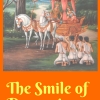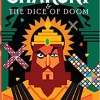
The high-octane showdown of dharma and adharma in the Mahabharata obscured how some fascinating women guided the course of events by their wrath and shenanigans. The greatest misfortune of the Kaurava family was that it never managed to keep its women happy. Some of those women did not matter much, and some did very much. The women bore murderous grudges in their hearts, sometimes even beyond one lifetime, and wreaked terrible vengeance upon their male adversaries. The hapless men danced to their tunes to perish fighting each other and caused a collapse of the great establishment they belonged to, without properly realizing exactly what caused their fall.
Take the case of Amba. She had to be re-born as Shikhandi to settle scores with Bheeshma. Bheeshma abducted her, along with her two sisters from their swayamvara ceremony to get them married to Vichitraveerya (Bheeshma’s step-brother). But Amba had been betrothed to the king of Shalwa. Knowing that, Bheeshma gracefully returned her to him but he refused Amba. Then she requested Bheeshma to marry her. But as he was bound by his own oath of celibacy, Bheeshma too declined. Refused once again, the poor girl decided to punish Bheeshma whom she held culpable for her misfortune. She worshipped Lord Shiva and extracted a boon from him that in her next birth, she would be born a man and cause Bheeshma’s fall. The woman could not wait further and self-immolated to get birth again. Bheeshma was aware of the development and also recognized Shikhandi as Amba’s reincarnation. Curiously, Bheeshma almost invited Shikhandi to ruin himself. The grand old man thus passively surrendered to Amba’s vengeance, silently paying tribute to an unexpressed affection in spite of having a boon of swechchamrityu (voluntary choice of own death). Bheeshma could have easily avoided the disaster but did not as he was stung by the virulent scorn of a woman and was already under the spell of inevitable doom.
Satyavati was the mother of Vyasadeva, the author. Though Vyasa candidly described his mother’s union with Rishi Parashar, he did not throw much light on her character and personality. Possibly, Vyasa played the typical protective son carefully hiding his mother from attention. However, whatever little is known about her is quite intriguing. Satyavati was the biological daughter of the Chedi king ‘Uparichar’ Vasu of Puru dynasty and was born outside wedlock to an apsara named Adrika. Adrika begot twins – a daughter (Satyavati) and a son (Matsya). But Uparichar accepted only the son and gave away the daughter to a fisherman! The ‘princess’ Satyavati, unfortunately, had to grow up in the stinking house of a petty fisher. But destiny had other plans. She caught the attention of the Kuru king Shantanu one day. It is quite well-known how a bewitched Shantanu would slip into depression, how his son Bheeshma would intervene and how cunningly Satyavati’s adoptive father (the fisherman) would negotiate the deal that robbed Bheeshma of the right to the throne and made him embrace lifelong celibacy. This is one of the most curious events of the epic. Why did the petty fisherman make such negotiations? How dared he? Apart from his adopted daughter’s establishment in the royalty, he himself and his family were to get nothing from that deal. Why, then, did he rub the king and the prince in the wrong way? Was it actually Satyavati who pulled strings from behind? She had once been abandoned by her biological father and denied her legitimate rights in the great house of Puru. Was her marriage with Shantanu actually a kind of lex-talionis as she thus returned to the Puru house (Kuru family being a sub-clan of the Puru dynasty) ruining all prospects of a bright, young Bheeshma?
Gandhari was made to marry a blind Dhritarashtra. It was not clearly mentioned in the Mahabharata whether she was forced or circumstances so demanded. But it is quite obvious that she might not have been too happy about it. She started wearing a strip of cloth over her eyes, ostensibly for ‘sharing’ her husband’s blindness. Was it actually so, or a bitter, silent protest against the grave injustice meted out to her? Gandhari was undoubtedly an extraordinary woman. She had a clear conception of dharma. Why then could not she raise her hundred sons a little more carefully so that they could have inherited the same sense of dharma from her? Gandhari’s secret rancour might have caused this unconscious negligence towards her children which ensured the great devastation. Was it also really difficult for her to rein in her devious brother Shakuni who religiously plotted and brought about the downfall of the house? How could not she breathe good senses in her weak husband’s mind? Or, did she just let things be the way they were? Did she actually want it deep inside, beneath a very different, if not a deceptive façade? Her sighs of anguish disqualified the Kaurava’s to have a bright future. But still, she was a mother. How could she have been indifferent to the loss of her one hundred sons? Her demented curse on Krishna was too severe even for the god. Krishna and the great Yadavas fell to her frightening foreboding which was tragically spot-on. Her quiet revenge on the Kuru house may be a matter of conjecture, but her crazy scream of wrath on our most adorable god seems too unsettling even today.
No woman could control the fate of the Kaurava house the way Kunti did, almost unnoticed. Kunti had reasons to develop a stinging bitterness for men quite early in her life. She was born into the Yadava house but her father Shurasena (grand-father of Krishna) gave her away to his friend Kuntibhoja – the king of Kunti kingdom. Kunti, with a subdued exasperation, would later liken herself with a swan drifting away from one pond to another, referring to her move from a household to other. But this was only the beginning of her misfortune! She got a divine power from Rishi Durbasa to invite gods at will and receive sons by their grace. She was only a child then. Obviously, she was unable to realize the gravity of the power at that time, nor was she given any advisory regarding cautious use of the power. She called Lord Surya playfully and her childhood was destroyed. Could not the god have showered a fatherly affection on this innocent, immature human girl instead of the desire she had caused in him? Kunti felt violated and would feel so repeatedly when her impotent husband Pandu pushed her into fornication three more times to beget as many sons. Her offended and unattended femininity smarted from an unbearable stigma throughout her life. She, meanwhile, had to face a very different kind of injustice inside the family. The reigning Kauravas first unsuccessfully tried to murder her and her sons, then gave them a godforsaken part (Khandavaprastha) of the kingdom to rule, then tricked away their property, humiliated her daughter-in-law and sent her sons to exile for thirteen years. Kunti had to make conscious efforts to get over her private, feminine wound as she became more anxious about the political raw deal her sons were made to suffer. The poor woman was to find solace from nowhere! She fulminated secretly with her wrath but never quite exploded. That was the beauty of her character. Even when her sons and daughter-in-law were banished from the kingdom, she stayed put in Hastinapura to remind the enemies of her right on the kingdom. She needed to know the developments in the enemy camp, too. When she noticed her sons in low spirit, she castigated them with scathing words. She knew the importance of suitable retribution, regardless of its cost. But she knew another thing. The revenge she was bracing her sons up for was only for their good, not hers. Her private laments were not to fall on any ear. Her secret wounds were never to heal. That’s why, she detached herself from the ultimate glory of her sons and walked lonely into a solemn sunset. Her vengeance was not only against some pathetic men, it was against her own self as well.
And Draupadi, the femmefatale! The feisty, fire-born woman has today become an iconic emblem of feminism. Draupadi herself was like a curse, albeit born to complement a boon. Drupada, her father, only needed a valiant boy to avenge his defeat and humiliation at the hands of Dronacharya. Drupada never wanted a daughter. But how would the son have killed Drona, unless a suitable stage was set up? So, Dhrishtadyumna and Draupadi were born together – the son for killing Drona and the daughter – for causing a devastating war to pit Dhrishtadyumna against Drona! She showed the doom in, unconsciously. It was only upon her bizarre marriage to the Pandava brothers, did she consciously learn to hate men! To make the marriage happen, unabashed machinations were going on right in front of her eyes. Her own father and brother were also party to it! She, just like any other ordinary woman, only wanted to love and marry a single good man; never did she want an august crowd to get married to! And soon enough she would get to understand exactly to what despicable low the male species could stoop! In Hastinapura, an unmitigated disaster would befell her, thanks to her ‘heroic’ husbands and ‘priceless’ brothers-in-law! Unlike other female protagonists, her ordeal was flagrant and gross, forming an integral part of the epic’s main theme. But the poor men did not know that she was an anathema – she was fatal! Duryodhana, Duhshasana, Karna, Shakuni, Jayadrath, Keechaka, Ashwatthama – all had to succumb to her fervent scorn. Not even her husbands were spared, nor were her father and brother! Even when Krishna was trying to broker peace between the two belligerent sides, the war remained assured. “Shame on Arjuna’s archery skill, shame on Bheema’s strength – Duhshasana is still alive!” Draupadi’s fumes strangled the last chance of peace and sealed the fate of the Kauravas. The woman’s rage had already issued death warrants!
But did the women win, ultimately? The fire they lit up burnt them as well. The fall of their adversaries cost them too dear. When Bheeshma fell, the soul of Amba only rested in terrible fatigue, perhaps. Satyavati’smanoeuvres gave her nothing save a vacuous identity of royalty. Gandhari was marooned to a world of darkness where she had to hover ahead trudging upon the corpses of her sons. Kunti died every single moment in her life in spite of her extraordinary ability to live through. And a battered, bruised Draupadi fell to a lonesome death with her wasted romance and a cruel final verdict that declared her disloyalty.
About the Author







Comments